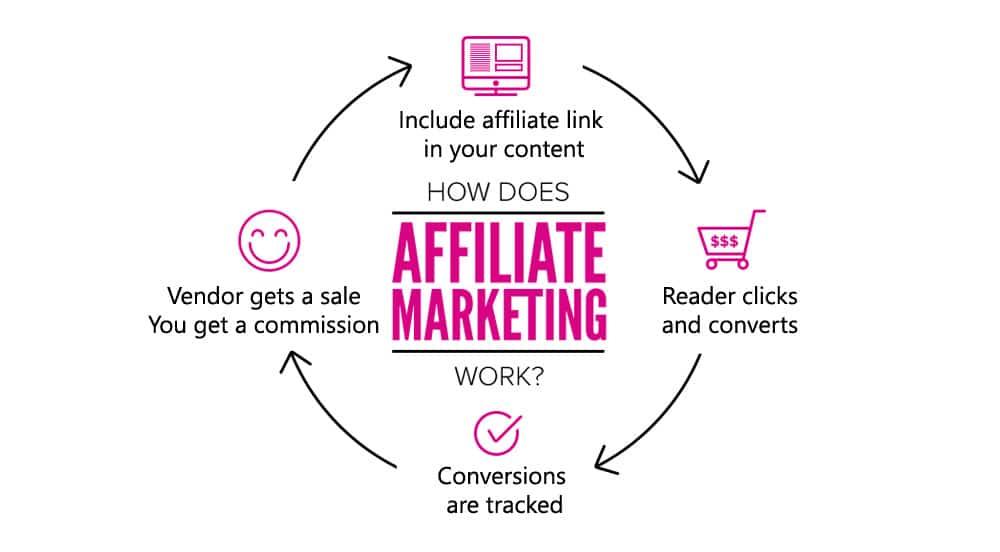What is Affiliate Marketing? (How to Do Affiliate Marketing in 2025?)
Hey there! If you’ve ever found yourself scrolling through social media or browsing a blog and wondered how those influencers and creators seem to make money just by sharing their favorite products, you’re not alone. Welcome to the fascinating world of affiliate marketing—a dynamic and increasingly popular way to earn income online. But what exactly is affiliate marketing, and how can you jump on this lucrative trend in 2025?
In this article, we’ll break down the essentials of affiliate marketing, exploring its benefits, the different strategies you can employ, and how the landscape is evolving in the coming year. Whether you’re a seasoned marketer or just starting to dip your toes into the online business world, we’ve got you covered. Get ready to unlock the secrets to making money while you sleep—yes, it’s possible! Let’s dive in and discover how you can make affiliate marketing work for you in 2025 and beyond.
What is Affiliate Marketing and Why Should You Care in 2025
Affiliate marketing is evolving rapidly, and by 2025, it has become a cornerstone for both brands and individuals looking to monetize their online presence. At its core, affiliate marketing involves promoting a product or service and earning a commission for every sale made through your referral link. This model is appealing to both businesses and affiliates for several reasons:
- Low Start-Up Costs: You don’t need to create a product or maintain inventory, making it an attractive option for anyone looking to start an online business.
- Flexibility: Affiliates can choose products that resonate with their audience, allowing for a more authentic promotion.
- Performance-Based Earnings: You only earn when a sale is made, which motivates affiliates to optimize their promotion strategies.
As we move deeper into the digital age, the importance of affiliate marketing continues to grow. In 2025, consumers have become savvier, relying on trusted recommendations and authentic content when making purchasing decisions. This shift means that effective affiliate marketers focus on building relationships with their audience, engaging them through valuable content, and cultivating trust. Here are some key strategies to employ:
- Create Quality Content: Your audience craves genuine insights. Write reviews, tutorials, and guides that genuinely help them solve problems.
- Utilize Social Media: Platforms like Instagram, TikTok, and YouTube are perfect for promoting products in a visually appealing way.
- Leverage SEO: Optimize your content for search engines to attract organic traffic, increasing your chances of earning commissions.
In 2025, the landscape of affiliate marketing is also shaped by technology. Artificial Intelligence and data analytics provide marketers with insights into consumer behavior, allowing for more targeted advertising. This means that understanding where your audience spends their time online and what influences their buying decisions is crucial. Using tools that analyze trends and preferences can set you apart from competitors.
| Trend | Impact on Affiliate Marketing |
|---|---|
| AI-Driven Analytics | Enhanced targeting and personalization of content. |
| Video Content Growth | Higher engagement rates and conversion potential. |
| Social Commerce | Direct purchasing from social media platforms increases affiliate opportunities. |
as we look towards 2025, the potential of affiliate marketing is immense. By adapting to the changing landscape, embracing new technologies, and focusing on authentic connections with your audience, you can make the most of this dynamic field. Whether you’re a seasoned affiliate or just starting, understanding these shifts will position you for success in the years to come.
Understanding the Basics: How Affiliate Marketing Works
Affiliate marketing is a powerful strategy that allows individuals to earn income by promoting products or services offered by other companies. At its core, it involves three key players: the merchant, the affiliate, and the consumer. The merchant provides the products, the affiliate promotes them, and the consumer makes a purchase. In exchange for driving sales, the affiliate earns a commission, which can vary based on the terms set by the merchant.
To successfully engage in affiliate marketing, understanding how to effectively promote products is essential. Here are some strategies to consider:
- Choose the Right Niche: Focus on a specific area that aligns with your interests and expertise. This helps you create authentic content that resonates with your audience.
- Build a Strong Online Presence: Utilize platforms like blogs, social media, and email newsletters to connect with your audience and provide valuable content.
- Leverage SEO: Optimize your content for search engines to increase visibility and attract organic traffic to your affiliate links.
Another important aspect of affiliate marketing is tracking the performance of your campaigns. By utilizing analytics tools, you can gain insights into which products are performing well and refine your strategies accordingly. Here’s a simple comparison of popular affiliate marketing platforms:
| Platform | Commission Rate | Payment Frequency |
|---|---|---|
| Amazon Associates | 1% – 10% | Monthly |
| ClickBank | 50% – 75% | Weekly |
| ShareASale | 5% – 50% | Monthly |
Building relationships with your audience is crucial in affiliate marketing. Authentic engagement fosters trust, making your recommendations more credible. Utilize storytelling techniques to share personal experiences with the products you promote—this humanizes your brand and encourages conversions.
As you navigate through the world of affiliate marketing, it’s also vital to stay updated on industry trends and compliance regulations. The digital landscape is constantly evolving, and being informed will ensure you adapt your strategies effectively. Remember, the key to long-term success lies in providing value to your audience while continuously refining your approach.
Choosing the Right Affiliate Programs for Your Niche
When diving into affiliate marketing, selecting the right programs tailored to your niche can make all the difference between passive income and a total flop. It’s essential to focus on programs that resonate with your audience while also aligning with your interests. After all, promoting products or services that you truly believe in not only enhances your credibility but also encourages your audience to engage with your recommendations.
Here are some key factors to consider when evaluating affiliate programs:
- Relevance: Choose programs that cater specifically to your niche. This ensures that the products or services you promote are appealing to your audience and increases the likelihood of conversions.
- Commissions: Look for programs that offer competitive commission rates. Higher commissions mean more revenue for you, but also consider the overall value of the product and its price point.
- Trustworthiness: Partner with reputable companies. A strong brand presence not only boosts your credibility, but also ensures your audience feels secure in their purchases.
- Support and Resources: Opt for programs that provide marketing materials, analytics tools, and ongoing support. These resources can significantly enhance your promotional efforts.
- Payment Structure: Understand how and when you’ll be paid. Programs with reliable payment schedules and options are essential for managing your income stream effectively.
To illustrate how various affiliate programs differ, here’s a quick comparison table of popular programs within different niches:
| Program | Niche | Commission Rate | Payment Frequency |
|---|---|---|---|
| Amazon Associates | General | 1% – 10% | Monthly |
| ClickBank | Digital Products | 50% – 75% | Weekly |
| ShareASale | Fashion & Lifestyle | 5% - 50% | Monthly |
| Bluehost | Web Hosting | $65 per sale | Monthly |
Finding the perfect affiliate program takes time and research, but it’s a crucial step in maximizing your affiliate marketing success. The more aligned the program is with your niche and audience, the easier it will be to create authentic content that converts. Keep testing and refining your choices, and you’ll soon see which programs yield the best results!

Crafting Compelling Content That Converts
In the world of affiliate marketing, the key to success lies in your ability to create content that resonates with your audience and drives conversions. When crafting your posts, it’s essential to focus on delivering value while subtly guiding your readers toward making informed purchasing decisions. Here are a few strategies to keep in mind:
- Understand Your Audience: Before you start writing, take the time to research your target demographic. What are their pain points? What solutions are they seeking? Tailoring your content to address these specific needs can significantly increase engagement.
- Use Storytelling: People connect with stories. Sharing personal experiences or anecdotes related to the products you promote can enhance relatability, making your recommendations feel more authentic.
- Highlight Benefits Over Features: While it’s tempting to list all the features of a product, your audience wants to know how it will improve their lives. Focus on benefits that directly relate to their needs and desires.
Another critical aspect of compelling content is the call-to-action (CTA). A well-placed, persuasive CTA can significantly influence your readers’ actions. Here are some effective approaches:
- Be Direct: Use clear and commanding language. Instead of saying, “you might want to check this out,” try “click here to transform your fitness journey today!”
- Create Urgency: Encourage immediate action by including time-sensitive offers or limited stock alerts. Phrases like “only available until midnight” can prompt quicker decisions.
- Incorporate Visuals: Use images, infographics, or videos that complement your written content. Visuals not only break up the text but also enhance understanding and engagement.
Lastly, remember to optimize your content for search engines. While creating engaging and persuasive posts is vital, you also want potential customers to find your content easily. Consider the following SEO tips:
- Use Keywords Naturally: Identify relevant keywords and integrate them seamlessly into your content without sacrificing readability.
- Optimize Meta Descriptions: Craft concise and persuasive meta descriptions that encourage clicks from search results.
- Backlink Strategically: Link to authoritative sites and encourage backlinks to your content to improve credibility and visibility.
By focusing on these elements, you’ll be well on your way to crafting content that not only informs but also converts. Remember, in affiliate marketing, every word counts, so make each one work in your favor!

Mastering the Art of SEO for Affiliate Success
In the ever-evolving landscape of digital marketing, mastering SEO is paramount for anyone looking to excel in affiliate marketing. With the right strategies, you can drive targeted traffic to your affiliate offers, ensuring that your efforts translate into meaningful income. Here’s how you can fine-tune your SEO game for affiliate success.
Keyword Research is the cornerstone of effective SEO. Understanding what your target audience is searching for will allow you to create content that resonates with them. Utilize tools like Google Keyword Planner or Ubersuggest to identify high-traffic, low-competition keywords that relate to your niche. By strategically integrating these keywords into your content, you increase your chances of ranking higher in search engine results.
Quality Content Creation is non-negotiable. Search engines reward websites that provide valuable, engaging, and informative content. Focus on creating in-depth articles, guides, and reviews that not only promote your affiliate products but also address the needs and pain points of your audience. Incorporate visual elements like images and videos to enhance user experience and keep visitors on your page longer.
Another essential aspect is On-Page SEO. This includes optimizing title tags, meta descriptions, and header tags with your primary keywords. Use internal linking to guide users to related content on your site, and don’t overlook the importance of a clean URL structure. Here’s a simple table to illustrate some on-page SEO elements:
| Element | Best Practices |
|---|---|
| Title Tag | Include primary keyword, keep it under 60 characters |
| Meta Description | Summarize content, include keywords, under 160 characters |
| Header Tags | Use H1 for titles, H2 for sections, include keywords |
Link Building is crucial for boosting your site’s authority. Seek out opportunities for guest blogging, collaborate with niche influencers, and engage in social media sharing to build backlinks. Quality over quantity is key; focus on acquiring links from reputable sites that add value to your own. As your domain authority grows, so will your visibility, leading to increased traffic and higher conversions.

Leveraging Social Media to Boost Your Affiliate Sales
In today’s digital landscape, social media has become a powerhouse for driving traffic and boosting affiliate sales. With billions of active users across various platforms, the potential to connect with your target audience has never been greater. To effectively leverage social media for your affiliate marketing efforts, consider implementing these strategies:
- Choose the Right Platforms: Not every social media platform will be suitable for your niche. Research where your target audience spends most of their time and focus your efforts there. Whether it’s Instagram, TikTok, or Facebook, tailor your content to fit the platform’s unique characteristics.
- Create Engaging Content: Visuals are key on social media. Use high-quality images, videos, and infographics to capture your audience’s attention. Storytelling can also enhance engagement; share personal experiences with the products you promote to build trust and authenticity.
- Utilize Hashtags and Keywords: Hashtags are essential for extending the reach of your posts. Use relevant and trending hashtags to increase visibility. Additionally, optimize your content with keywords that potential customers might use to search for the products you promote.
Another effective tactic is to collaborate with influencers within your niche. Partnering with influencers can provide access to a larger audience and lend credibility to your recommendations. Ensure that the influencers you choose align with your brand values and target demographic to maximize the impact of your campaigns.
Don’t underestimate the power of social media ads. Platforms like Facebook and Instagram offer targeted advertising options that can help you reach your ideal customers. With the right ad strategy, you can promote your affiliate links effectively while tracking performance metrics to refine your approach.
engage with your audience authentically. Respond to comments, answer questions, and participate in conversations. Building a community around your brand not only fosters loyalty but also encourages sharing, which can amplify your affiliate sales exponentially.

Building Trust with Your Audience: The Key to Long-Term Success
In the world of affiliate marketing, establishing a genuine connection with your audience is not just beneficial; it’s essential. When your readers see you as a trusted guide rather than just another marketer, they’re more likely to engage with your recommendations and take action. Building this trust requires consistency, transparency, and a commitment to delivering value.
One effective way to foster trust is by sharing personal experiences with the products or services you promote. When your audience knows that you’ve personally vetted the offerings, they’re more likely to view your recommendations as credible. Here are some strategies to consider:
- Be Authentic: Share your real thoughts and experiences. If a product didn’t work for you, let your audience know.
- Engage with Your Audience: Respond to comments and questions promptly, and encourage discussions around the products you promote.
- Provide Value: Focus on content that helps your audience solve problems or meet their needs rather than just selling.
Another vital aspect of building trust is transparency. Make it clear that you earn a commission from the products you promote. This honesty not only aligns with ethical practices but also helps your audience feel more comfortable making purchases through your links. Incorporating disclaimers in your posts shows integrity and respect for your audience.
To further enhance your relationship with your audience, consider creating a content calendar that reflects their interests and needs. Here’s a simple table showcasing potential content types you might include:
| Content Type | Purpose |
|---|---|
| Product Reviews | Provide honest assessments of products you’ve used. |
| Tutorials | Guide your audience on how to use the products effectively. |
| Comparison Posts | Help your audience make informed decisions between similar products. |
By consistently delivering valuable, honest, and engaging content tailored to your audience’s interests, you’ll not only build trust but also create a loyal community around your brand. In the ever-evolving landscape of affiliate marketing, this trust will be your greatest asset, paving the way for sustainable success in 2025 and beyond.

Tracking Your Performance: Tools and Metrics You Can’t Ignore
When diving into affiliate marketing, tracking your performance is essential for success. Understanding how your strategies are performing will help guide your decisions and increase your revenue. Here are some tools and metrics you can’t afford to overlook:
- Google Analytics: This powerful tool allows you to track website traffic, user behavior, and conversions. Set up goals to see how well your affiliate links are performing.
- Affiliate Network Dashboards: Most affiliate programs provide dashboards that detail clicks, conversions, and earnings. Regularly reviewing these stats can help you identify which products resonate most with your audience.
- Social Media Analytics: Utilize the built-in analytics tools on platforms like Facebook, Instagram, and Twitter to track engagement and traffic coming from your posts. This can give you insight into what content drives the most interest.
- Link Tracking Tools: Tools like Bitly or Pretty Links can help you create and manage trackable links. This way, you can see exactly where your clicks are coming from and which campaigns are the most effective.
In addition to tools, focus on key metrics that drive your affiliate strategy:
| Metric | Importance |
|---|---|
| Click-Through Rate (CTR) | Measures the effectiveness of your calls-to-action and content. |
| Conversion Rate | Shows the percentage of visitors who complete a desired action, crucial for profitability. |
| Return on Investment (ROI) | Helps you understand the profitability of your affiliate campaigns. |
| Average Order Value (AOV) | Informs you about the spending habits of your customers, helping to refine marketing strategies. |
By consistently monitoring these tools and metrics, you can adjust your strategies in real-time, ensuring you’re maximizing your efforts and profits. Make performance tracking a habit, and watch your affiliate marketing success soar.

Future Trends in Affiliate Marketing You Need to Watch
As we look ahead to the future of affiliate marketing, several emerging trends are set to transform the landscape, making it essential for marketers to stay ahead of the curve. Understanding these trends not only helps in strategizing better but also paves the way for greater profitability and efficiency.
Increased Personalization is becoming a cornerstone in marketing strategies. Customers now expect tailored experiences, and affiliate marketers who can deliver personalized content will see a significant boost in engagement and conversion rates. Utilizing advanced data analytics and AI-driven algorithms, marketers can better understand customer preferences and behavior, allowing for highly targeted campaigns.
Video Content is taking center stage. With platforms like TikTok and Instagram Reels gaining prominence, short-form video content is proving to be an effective way to attract and retain audience attention. Affiliate marketers should consider incorporating tutorials, product reviews, and unboxing videos into their strategies to capitalize on this trend. Not only do videos enhance user engagement, but they also drive traffic to affiliate links in a more impactful way.
Furthermore, an increasing focus on micro and nano influencers is reshaping how brands approach partnerships. While traditional influencers have their merits, smaller influencers often boast higher engagement rates and more authentic connections with their followers. Brands should consider fostering relationships with these influencers to tap into niche markets and build credibility in their offerings.
| Trend | Description | Actionable Insight |
|---|---|---|
| Increased Personalization | Custom-tailored experiences based on user data. | Leverage analytics for targeted campaigns. |
| Video Content | Utilization of short-form videos for engagement. | Create product demos and reviews. |
| Influencer Marketing | Focus on micro and nano influencers. | Build partnerships with niche influencers. |
Lastly, the rise of social commerce cannot be ignored. With social media platforms integrating shopping features, affiliate marketers must adapt by creating content that seamlessly blends product promotion with social interaction. This means being active on platforms where your audience spends their time and leveraging affiliate links directly within social media posts.

Tips and Tricks to Stay Ahead in the Affiliate Game in 2025
To thrive in the affiliate marketing landscape of 2025, you’ll need to embrace innovation and adaptability. The market is evolving rapidly, with new technologies and trends shaping how consumers interact with brands. Here are some essential strategies to keep you ahead of the competition:
- Leverage AI Tools: Utilize artificial intelligence to analyze data, optimize campaigns, and enhance customer experiences. AI can help you understand audience preferences and predict trends, allowing you to tailor your marketing strategies effectively.
- Focus on Niche Markets: Instead of competing in broad categories, carve out a niche. This approach allows you to target specific audiences with tailored content and recommendations, increasing your chances of conversion.
- Utilize Video Content: Video marketing continues to grow in popularity. Create engaging video content that showcases products and provides value to your audience. Platforms like TikTok and YouTube can significantly boost your visibility.
Moreover, building strong relationships with your affiliate partners can give you a competitive edge. Communication is key; ensure you’re both on the same page regarding goals and strategies. Consider these points:
- Regular Check-ins: Schedule consistent meetings to discuss performance, challenges, and opportunities for collaboration.
- Exclusive Promotions: Work with partners to offer exclusive deals or promotions to your audience, enhancing the value of your recommendations.
Additionally, staying updated on regulatory changes is crucial. As consumer protection laws evolve, ensure that your affiliate practices comply with new guidelines. Regularly review your affiliate agreements and contracts to maintain transparency and trust with your audience.
Lastly, invest in your personal brand. Authenticity resonates with consumers, and a strong brand presence can significantly influence their purchasing decisions. Consider the following:
- Create a Distinct Voice: Your unique perspective can set you apart. Use storytelling to connect with your audience on a personal level.
- Engage on Social Media: Build a community around your brand by actively participating in discussions and responding to feedback.
| Strategy | Benefit |
|---|---|
| Utilize AI Tools | Enhanced data analysis and campaign optimization |
| Focus on Niche Markets | Higher conversion rates through targeted content |
| Video Content Creation | Increased audience engagement and visibility |
Frequently Asked Questions (FAQ)
Q&A: What is Affiliate Marketing? (How to Do Affiliate Marketing in 2025)
Q1: What exactly is affiliate marketing?
A: Great question! Affiliate marketing is a performance-based marketing strategy where you earn a commission for promoting someone else’s products or services. Essentially, you act as a middleman, connecting potential customers with businesses. When someone makes a purchase through your unique affiliate link, you earn a percentage of the sale. It’s a win-win—businesses get more sales, and you make money!
Q2: How does one get started with affiliate marketing?
A: Starting your affiliate marketing journey is easier than you might think! First, choose a niche that you’re passionate about or knowledgeable in. This could be anything from fitness to tech gadgets. Next, sign up for affiliate programs that align with your niche—think Amazon Associates, ShareASale, or even individual company programs. Once you have your affiliate links, create engaging content to share with your audience, whether it’s through a blog, social media, or YouTube.
Q3: Why should I consider affiliate marketing in 2025?
A: Affiliate marketing is projected to keep growing, especially in 2025! As more people shop online, the demand for authentic recommendations increases. Plus, it offers flexibility—work from anywhere, set your hours, and scale your efforts based on what works best for you. With the rise of social media and influencer marketing, there’s never been a better time to jump in and monetize your passions.
Q4: What challenges might I face as a beginner in affiliate marketing?
A: Every journey has its bumps! As a beginner, you might struggle with building an audience or understanding which products to promote. It can also take time to see significant earnings. However, persistence is key! Focus on creating valuable content, engage with your audience, and don’t hesitate to learn from others in the field. Remember, every expert was once a beginner!
Q5: How can I make my affiliate marketing efforts more effective in 2025?
A: To amp up your efforts, leverage data analytics to understand your audience better. Use SEO strategies to enhance your website’s visibility. Engaging multimedia content like videos and podcasts can help you connect with your audience on a deeper level. Additionally, stay updated on digital marketing trends and adapt your strategies accordingly. The more you evolve, the more successful you’ll become!
Q6: Is it possible to make a full-time income through affiliate marketing?
A: Absolutely! Many affiliates earn a full-time income or even six-figures annually. However, it requires dedication, strategic planning, and consistent effort. Success won’t happen overnight, but with the right approach, you can build a sustainable income stream. Focus on high-quality content, growing your audience, and diversifying your affiliate partnerships to maximize your earnings.
Q7: Any final tips for aspiring affiliate marketers?
A: Definitely! First, choose products you genuinely like and believe in. Authentic recommendations build trust with your audience. Second, stay patient and don’t get discouraged by initial slow results. Success takes time! Lastly, keep learning. The digital landscape is always changing, so staying informed about new tools, trends, and techniques will keep you ahead of the game. Ready to take the plunge? Let’s make 2025 your best year yet in affiliate marketing!
To Conclude
As we wrap up our exploration of affiliate marketing, it’s clear that this dynamic field is more than just a buzzword; it’s a viable opportunity for anyone looking to earn extra income, whether you’re a seasoned marketer or just starting out. By understanding the basics and staying ahead of the curve in 2025, you can create a successful affiliate marketing strategy that works for you.
Remember, it’s not just about promoting products; it’s about building trust and providing value to your audience. So, take the insights we’ve shared, dive into this exciting world, and start taking actionable steps toward your affiliate marketing goals.
With the right approach and a commitment to continuous learning, you can transform your passion into profit. So why wait? Start exploring the endless possibilities of affiliate marketing today, and who knows? Your next big breakthrough might be just around the corner. Happy marketing!

